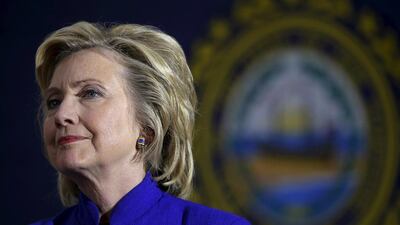Scandals in Washington are not like scandals in other places. A normal political scandal has to include some or all of the following: money going into the wrong pockets, marital infidelity and association with criminals or other dubious characters. Any of these elements will ensure that the public will follow the scandal with gusto. But Washington has a proud tradition of producing incomprehensibly knotty scandals which dominate the airwaves but can only be followed by political junkies.
Such is the case these days with a scandal enveloping Hillary Clinton, the former first lady and secretary of state who is running for the Democratic nomination for president in 2016. Unlike the simple scandals which dogged her husband, Bill Clinton, there is nothing piquant in the controversy over her use of a private email address while serving as secretary of state. But Mrs Clinton is such a polarising figure that this one is certain to run and run.
It is overshadowing her campaign launch. Members of the press corps – often no friends of Mrs Clinton – are gleefully recalling that her last run at the White House, in 2008, imploded when she was beaten by the outsider from Illinois named Barack Obama.
The source of Mrs Clinton’s troubles is that while secretary of state she used a private email address for both personal and government business. She says this was for speed and convenience – enabling her to use one BlackBerry smartphone not two. The server used for the email account was housed at a Clinton property under the protection of the US Secret Service and there is no suggestion it was hacked or tampered with by foreign spies.
The Republicans are pursuing the issue, looking for possible breaches of government security that would undermine her presidential bid. Mrs Clinton has handed over copies of 55,000 emails and this week, after months of refusal, agreed to turn her private email server over to investigators. She says none of the communications on her private account contained classified information – at least not when she sent them. However, an intelligence inspector says at least two emails contained top secret information that should have been classified.
These two statements are not as contradictory as they appear. Different branches of government in Washington have their own ideas of what is secret, and what was unclassified when emailed may subsequently be deemed secret. At this point, the scandal moves deep into incomprehensible territory. More and more emails are likely to be published, and even if there is no smoking gun, few people emerge unscathed when their correspondence is open to public view.
The Republican Speaker of the House of Representatives, John Boehner, has raised the stakes, calling for what started as a security audit to become a criminal investigation into “mishandling of classified information”.
There is no suggestion that any state secrets fell into the hands of the wrong people. It is all the more surprising since in America top secret is not particularly secret. According to the Washington Post, 5.1 million Americans held security clearances in 2013. Of those, no fewer than 1.5 million were cleared for top secret material.
Among those with top secret clearance was the whistle blower Edward Snowden, a contractor (not staff member) based in Hawaii who revealed the full extent of the National Security Agency’s eavesdropping at home and abroad.
Mrs Clinton is still the front-runner for the Democratic nomination, but the email security issue could encourage other contenders. For the Republicans, the goal would be to find an email that supports allegations that she has been less than fully open about a catastrophic incident under her leadership of the State Department – the killing of the US ambassador in Libya, Chris Stevens, by an Al Qaeda-inspired mob.
At the other end of the political spectrum, Jeb Bush, brother of the president who invaded Iraq in 2003 and who is running for the Republican nomination, is also wrestling with history. Having been faulted for not being able to say whether he supported the Iraq war, Mr Bush this week went on the offensive, trying to lay the blame for the chaos in Iraq and the rise of ISIL on President Obama and Mrs Clinton. The premature withdrawal from Iraq was a “fatal error” creating a void that ISIL rushed to fill, Mr Bush said. Mrs Clinton had “stood by” and let this happen.
There are several issues with this approach of blaming the inheritors not the instigators. Mr Obama was elected on a clear promise to end an unpopular war. The rise of ISIL has as much to do with the disbanding of the Iraqi army as any decision taken later. And it was the Iraqi prime minister, Nouri Al Maliki, installed with the help of the George W Bush administration, who insisted that all US troops must leave.
Mr Bush and Mrs Clinton both suffer from having to defend a record in power, personal or familial. It is not for nothing that Washington outsiders are more easily elected president than insiders. As the election heats up, the name recognition among voters of being a Bush or a Clinton – generally seen as a positive – may be outweighed by the historical baggage.
Mrs Clinton’s fate is tied to that of Mr Obama – in good ways and bad. The campaign focus on history may be unedifying for the rest of the world, looking for American leadership at a time of great instability, but it points to a strength of the Democrat side. With America booming under Mr Obama (unlike the financial shambles left by George W Bush) the usual electoral battleground of the economy is already held by the incumbent. That leaves the debate to focus on scratching historical scabs.
Alan Philps is a commentator of global affairs
On Twitter: @aphilps

